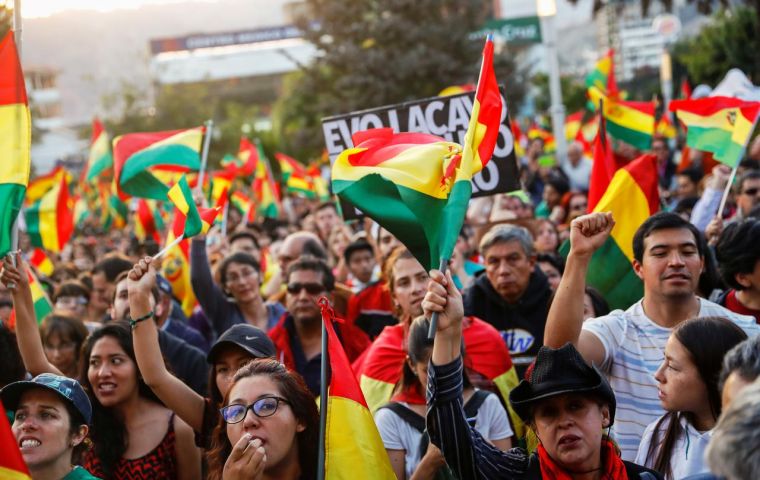MercoPress. South Atlantic News Agency
3 reasons why Latin America has erupted in protests
 Bolivia is one such example; as can be seen from the resignation of long-serving president Evo Morales. Despite attempting to cling onto power for as long as possible, widespread protests and accusati
Bolivia is one such example; as can be seen from the resignation of long-serving president Evo Morales. Despite attempting to cling onto power for as long as possible, widespread protests and accusati From Chile to Venezuela and Bolivia to Nicaragua, it’s no understatement to say that Latin America is on fire.
United by rage and frustration, both leftists and rightists have come together to protest their governments. Regardless of identity or political ideology, one thing is certain; the people of Latin America are angry.
Now with armored vehicles rolling down the streets of Chile and bloodshed looming on the horizon for Bolivians, experts have been left wondering what has caused this sudden explosion of emotion?
While the reasons are varied and many, there are several common threads that bind together this global phenomenon. Whether it’s discontent and equality to disillusion and mismanagement, join us as we take a look at why Latin America has erupted in flames.
1. Economic hardship
Home to more than 400 million people residing in 12 nations, Latin America has been described by writer Michael Reid as “the forgotten continent” of the world. Overshadowed by its Northern cousin, Latin America has often been regarded as being the backyard of America.
While most of Latin America may be blessed with vast amounts of natural resources, one can hardly notice it on the streets. Citizens struggle to make ends meet and economic prosperity appears to be a pipe dream. Fleeing their home countries in search of a better future, the trek abroad is a perilous one for many.
At home, the situation isn’t much better. Sex trafficking is endemic and many often fall prey to their own fellow countrymen.
With the largest wealth inequality gap in the world, the numbers show that a shockingly small percentage of the population control the majority of the wealth in the country.
Given the series of brutal dictatorships, corruption and kleptocrats, it’s no surprise to see that precious little of the wealth generated trickles down to the population. Over the years, all of this would naturally lead to anger and resentment being fomented amongst the population.
In Chile for example, the straw that broke the camel’s back was the hiking of rail transport fares in the nation. With half of the population earning slightly more than the minimum wage and one of the highest public transport fares in Latin America, it is no surprise that the population reacted violently.
This coupled with several blunders made by President Sebastián Piñera further served to stoke the already raging flames of discontent.
2. Human rights violations
Whether it’s death squads executing dissenters to enforced disappearances, It’s safe to say that most Latin American nations do not have an exactly stellar record when it comes to human rights.
For years since the end of colonialism, citizens of South American nations have languished under the rule of brutal dictators. Journalists and dissenters are silenced or whisked off to secret prisons where they endure a curriculum of torture and indoctrination.
Oftentimes, protests are put down by government troops beating citizens back with rifle butts and bayonets. However, having endured so much for so long, it would appear that citizens are rising up and telling their governments enough is enough.
Bolivia is one such example; as can be seen from the resignation of long-serving president Evo Morales. Despite attempting to cling onto power for as long as possible, widespread protests and accusations of election fraud finally forced the president to resign.
3. The power of social media
Social media has brought us all closer than ever before. With the widespread availability of smart devices, news and information can be spread easily and immediately.
The power of information has made it impossible for even the most totalitarian regime to suppress its people. As we’ve seen from the 2013 Ukraine Protests, social media made it possible for hundreds of thousands to mobilize and coordinate protests while at the same time sharing information to the world.
Instead of being blacked out by censorship, people have been able to share information from ground zero thus robbing the government of any legitimacy and further propelling protests. Not even the best NBA experts’ predictions would see it coming the protest in the Boston Celtics game in support for Hong Kong autonomy. So, we might see something similar for Latin America.
The future still remains uncertain for many Latin American nations. However, thanks to the freedom offered by the internet and social media, dictatorial governments will need to rethink their strategies.




Top Comments
Disclaimer & comment rules-

Read all commentsHere's one reason...
Dec 05th, 2019 - 08:01 am 0https://www.voanews.com/americas/oas-final-report-bolivia-election-rigging-favor-morales-overwhelming
Commenting for this story is now closed.
If you have a Facebook account, become a fan and comment on our Facebook Page!